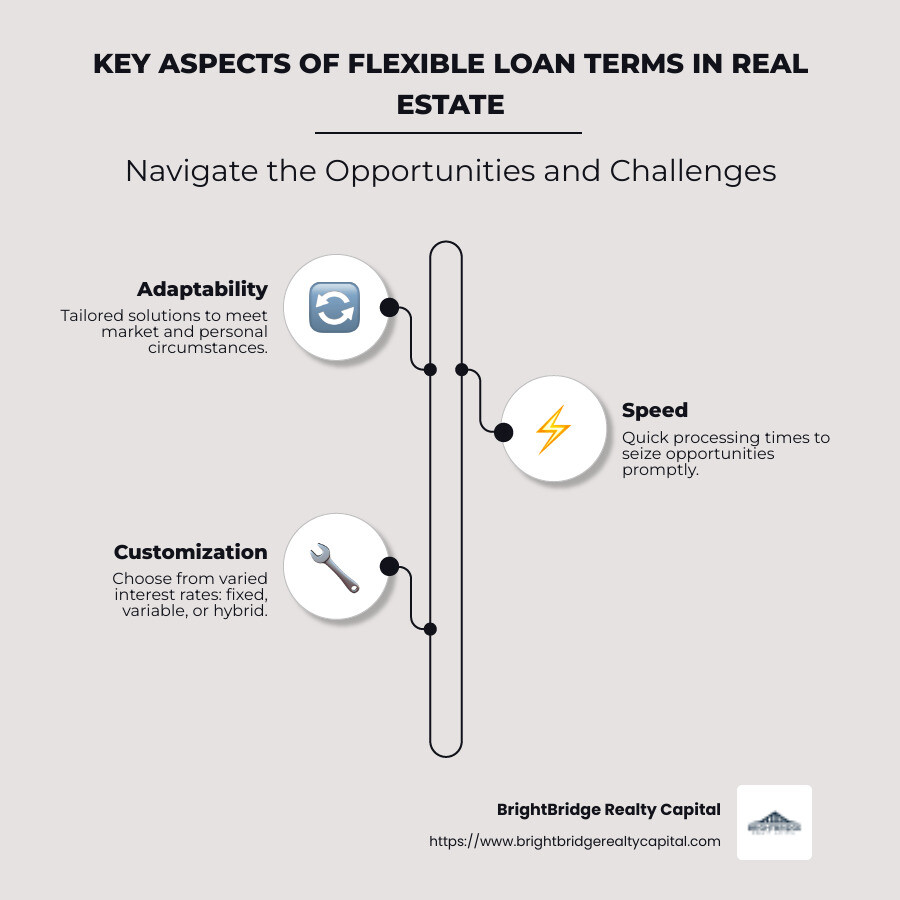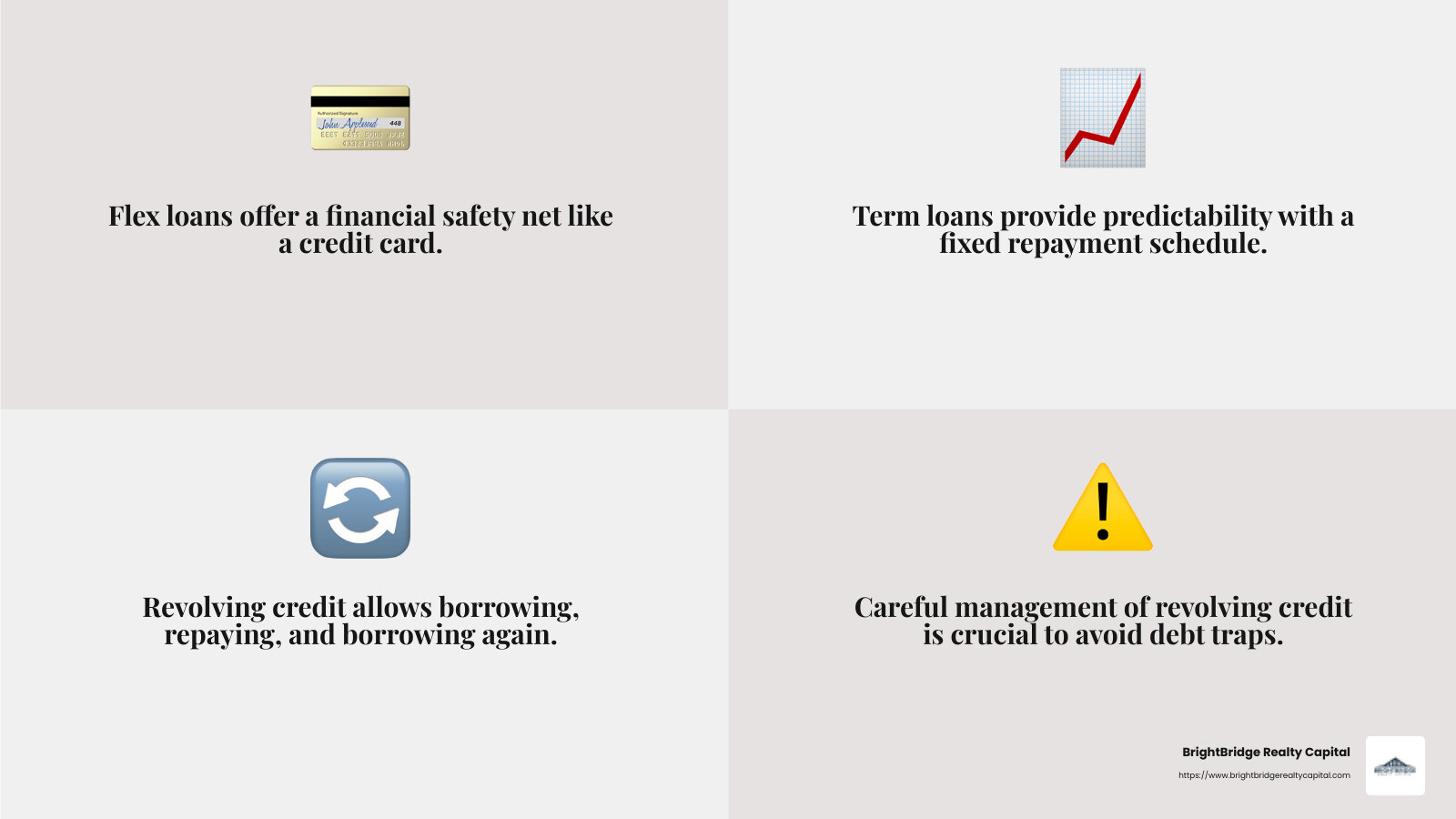Bend, Don't Break: Navigating Flexible Loan Terms

Navigating Flexible Loan Terms in Real Estate
Flexible loan terms have become a game changer in real estate financing. If you're navigating the complex landscape of real estate investments, especially in markets like fix-and-flip projects or expanding rental portfolios, you need a financing approach that bends to your needs without breaking.
Flexible Loan Terms at a Glance:
- Adaptability: Custom solutions that adjust to market and personal circumstances.
- Speed: Quick processing times help seize opportunities promptly.
- Credit Requirements: Often more lenient than traditional loans.
- Customization: Choose from varied interest rates—fixed, variable, or hybrid.
For investors, flexible loans offer the adaptability to tailor repayment terms and interest rates to fit strategic goals, delivering the freedom to capitalize on property deals swiftly. This flexibility is not just a convenience—it's essential for leveraging opportunities and enhancing profitability in a competitive market.

Flexible loan terms terms to know:
Understanding Flexible Loan Terms
Flexible loan terms give you the power to shape your financial commitments to suit your needs. Whether you're a seasoned real estate investor or just starting, understanding how these terms work can be your key to making smart financing decisions.
Customize Your Repayment Terms
One of the standout features of flexible loan terms is the ability to customize repayment terms. This means you can adjust the duration and structure of your loan to match your financial situation and investment strategy. Need a longer term to keep monthly payments low? Or perhaps a shorter term to reduce overall interest costs? The choice is yours.
Fixed, Variable, and Hybrid Interest Rates
When it comes to interest rates, flexible loans offer a range of options:
Fixed Rates: These rates stay the same throughout the life of the loan. They provide stability and predictability, making budgeting easier. You won't have to worry about market fluctuations affecting your payments.
Variable Rates: These rates can change over time, usually in line with market conditions. If you expect interest rates to drop or remain stable, a variable rate might save you money. However, they come with the risk of rising payments if rates increase.
Hybrid Rates: A combination of both fixed and variable rates. Typically, you start with a fixed rate for a set period, which then shifts to a variable rate. This option offers initial stability with the potential for lower rates later on.
Choosing the right type of interest rate depends on your risk tolerance and market outlook. If you prefer certainty, a fixed rate might be best. If you're willing to take on some risk for potential savings, a variable or hybrid rate could be more suitable.

In real estate financing, flexible loan terms are a strategic tool, offering customization and adaptability. They allow investors to tailor their financing to align with their unique goals and market conditions, ensuring they can seize opportunities when they arise.
Types of Flexible Loans
Flexible loans are like a Swiss Army knife for your financing needs. They come in various forms, each with unique features that can help you steer the financial landscape with ease. Let's explore the most common types: flex loans, term loans, and revolving credit.
Flex Loans
Flex loans are essentially a line of credit. Think of them as a financial safety net that you can tap into whenever you need cash. You borrow up to a set limit, much like using a credit card. The key advantage? Flexibility. You can borrow as much or as little as you need, as long as you stay within your limit.
However, be cautious. Flex loans often come with high interest rates. The convenience can be costly if you're not careful. Yet, for those with inconsistent income or poor credit history, flex loans can be a lifeline. They offer quick access to funds without the usual credit checks.
Term Loans
Term loans provide a lump sum of money upfront, which you repay over a fixed period. They are perfect for specific, one-time investments like purchasing equipment or real estate. The terms can vary, from short-term (a few months) to long-term (several years).
What makes term loans appealing is their predictability. With a set repayment schedule and interest rate, you know exactly what to expect each month. This makes budgeting simpler and helps you manage your cash flow with confidence.
Revolving Credit
Revolving credit is like having a financial revolving door. You borrow, repay, and borrow again, as long as you stay within your credit limit. It's a great option for businesses with fluctuating cash flow needs, such as seasonal operations.
One of the benefits of revolving credit is that you only pay interest on the amount you borrow. This can be more cost-effective than other loan types if your borrowing needs change frequently. However, manage it wisely to avoid excessive debt.

In summary, each type of flexible loan offers distinct advantages. Flex loans provide quick access to cash, term loans offer stability and predictability, and revolving credit gives you ongoing access to funds. The right choice depends on your specific needs and financial situation.
Flexible loans are not just financial products; they're tools that, when used wisely, can help you achieve your investment goals with greater ease and confidence.
Benefits of Flexible Loan Terms
Flexible loan terms offer several advantages that can make financing simpler and more accessible, especially for those who might not have a perfect financial record. Here's why they stand out:
Minimal Credit History Requirements
One of the biggest perks of flexible loan terms is that they often have minimal credit history requirements. This makes them a viable option for people with little or no credit history. Unlike traditional loans that demand a robust credit score, flexible loans can be more forgiving. This opens doors for many who might otherwise struggle to secure financing.
Quick Application Process
The application process for flexible loans is usually quick and straightforward. In many cases, you can apply and receive approval within the same day. This speed is a game-changer for those who need funds urgently. Whether you're facing an unexpected expense or a time-sensitive opportunity, flexible loans can provide the financial agility you need.
Fast Funding
Once approved, these loans offer fast funding. You gain access to the money you need almost immediately, allowing you to address your financial needs without delay. This is particularly beneficial in real estate, where timing can be crucial for securing deals or managing renovations.
Flexible loan terms are designed to be accessible, prompt, and efficient. They are perfect for individuals and businesses that need quick, reliable financial solutions without the hassle of extensive credit checks or long waiting periods. These benefits make flexible loans an attractive option for many borrowers, helping them steer their financial landscapes with ease.
Risks and Considerations
While flexible loan terms offer many benefits, it's crucial to be aware of the potential risks. Understanding these can help you make informed decisions and avoid financial pitfalls.
Higher APR
One significant downside of flexible loan terms is the higher Annual Percentage Rate (APR). These loans often come with interest rates that are considerably higher than traditional loans. For example, APRs can range from 24% to 28% and may even reach triple digits in some cases. This means the cost of borrowing can add up quickly, making it essential to carefully consider if the benefits of flexibility outweigh the expense.
Potential Fees
In addition to higher interest rates, flexible loan terms may include various fees. These could be flat fees, ongoing charges, or penalties for late payments. For instance, some lenders might charge fees for each withdrawal or redraw, adding to the overall cost of the loan. It's vital to read the fine print and understand all associated fees before committing to a loan, as these can significantly impact the total amount you repay.
Potential for Debt
The flexibility of these loans can also lead to a risk of accruing substantial debt. With the ability to borrow up to a set credit limit, there's a temptation to take out more than necessary. If you only make minimum payments, the balance can grow rapidly due to compounding interest. This can result in a cycle of debt that's difficult to escape. To mitigate this risk, it's important to budget carefully and borrow only what you need.
In conclusion, while flexible loan terms provide quick access to funds and are accessible for those with less-than-perfect credit, weigh these benefits against the risks of higher costs and potential debt. By understanding these considerations, you can make smarter financial choices and use flexible loans effectively.
Flexible Loan Terms for Real Estate Investors
Real estate investors often need quick access to capital to seize opportunities in a fast-moving market. Flexible loan terms can be a game-changer for these investors, offering a blend of speed, adaptability, and competitive rates.
Real Estate Financing
When investing in real estate, timing is everything. Whether you're purchasing a new property, refinancing an existing one, or making improvements, having the right financing in place is crucial. Flexible loan terms allow investors to tailor their repayment schedules to match their cash flow and investment strategy. This customization can make all the difference in turning a good deal into a great one.
Quick Funding
Speed is a key advantage of flexible loan terms. Traditional loans can take weeks or even months to process, but flexible options often provide funds much faster. This quick funding is vital in real estate, where opportunities can disappear overnight. With a streamlined application process, investors can secure financing in as little as two to three weeks, ensuring they don't miss out on lucrative deals.
Competitive Rates
While flexible loan terms might come with higher interest rates compared to traditional loans, they often offer competitive rates within their category. For instance, some flexible loans provide options like interest-only payments or variable rates, which can be advantageous depending on market conditions. By choosing the right loan structure, investors can manage their costs effectively and maximize their returns.
Flexible loan terms equip real estate investors with the tools they need to steer a dynamic market. By offering quick access to funds, customizable repayment options, and competitive rates, these loans can help investors capitalize on opportunities and grow their portfolios efficiently.
Frequently Asked Questions about Flexible Loan Terms
What is a Flex Loan?
A Flex Loan is a type of line of credit that offers borrowers access to cash up to an approved credit limit, similar to a credit card. Unlike traditional loans, a flex loan is generally unsecured, meaning you don't have to provide collateral like a house or car. This makes it accessible even to those with limited credit history, though it typically comes with high interest rates. Borrowers pay interest only on the amount they withdraw, offering a degree of flexibility in managing expenses.
How do Flexible Loan Terms Work?
Flexible loan terms allow borrowers to customize their repayment schedules. For instance, with a flex loan, you can borrow up to your credit limit as needed and repay at your own pace, as long as you meet the minimum monthly payments. This repayment flexibility can be especially useful if your income fluctuates or if you face unexpected expenses. However, be cautious of potential fees and higher interest costs, which can add up if you only make minimum payments.
Can Flexible Loan Terms Affect My Credit?
Yes, flexible loan terms can impact your credit score. Timely repayments can improve your credit score over time, making you eligible for better loan terms in the future. However, late payments can have the opposite effect, damaging your credit score and making it harder to secure loans. It's important to manage your loan responsibly, making payments on time and not exceeding your credit limit to maintain a healthy credit profile.
Conclusion
Navigating flexible loan terms can seem daunting, but it doesn't have to be. At BrightBridge Realty Capital, we specialize in offering customized solutions that fit your unique needs as a real estate investor. Our goal is to make the process as smooth and seamless as possible.
Whether you're looking to flip properties, build new constructions, or expand your rental portfolio, we provide quick and flexible funding options. Our direct lending approach means no intermediaries, which allows us to offer competitive rates and fast closings—often within a week. This speed and efficiency can make all the difference in securing a property or starting a project on time.
By choosing BrightBridge Realty Capital, you're not just getting a loan; you're gaining a partner committed to your success in the real estate market. We understand that every investor's strategy is unique, and our custom solutions are designed to help you achieve your goals without unnecessary hassle.
For more information on how we can assist you with your real estate financing needs, visit our BrightBridge Realty Capital service page. Let us help you bend, not break, through the ever-changing landscape of real estate investment.


